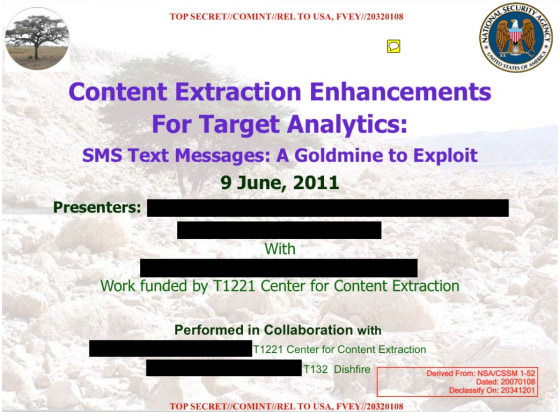- Sep 17, 2003
- 8,628
- 18
- 38
Hundreds of millions of texts snooped daily by NSA: Latest leak - NBC News.com

The Guardian has published details on yet another NSA program for the mass collection of mobile phone data. The latest, called "Dishfire," enables nearly 200 million text messages to be intercepted and stored every day, heedless of whether the sender or recipient is under investigation or not.
Dishfire is detailed in an 8-page presentation from 2011 provided by NSA whistleblower Edward Snowden; SMS communication is described as "a goldmine to exploit," and the leaked document goes on to explain how the content and metadata of texts can be used to determine location, contact networks, and other data.
The NSA issued a statement to the Guardian saying it deployed Dishfire only against "valid foreign intelligence targets," but this is contradicted by a memo from the United Kingdom's equivalent to the NSA that leaked along with the presentation. It reads in part:
Clearly, if the system can provide messages from before a target was being investigated, it is not being directed only at targets. The NSA has yet to account for this discrepancy.

The Guardian has published details on yet another NSA program for the mass collection of mobile phone data. The latest, called "Dishfire," enables nearly 200 million text messages to be intercepted and stored every day, heedless of whether the sender or recipient is under investigation or not.
Dishfire is detailed in an 8-page presentation from 2011 provided by NSA whistleblower Edward Snowden; SMS communication is described as "a goldmine to exploit," and the leaked document goes on to explain how the content and metadata of texts can be used to determine location, contact networks, and other data.
The NSA issued a statement to the Guardian saying it deployed Dishfire only against "valid foreign intelligence targets," but this is contradicted by a memo from the United Kingdom's equivalent to the NSA that leaked along with the presentation. It reads in part:
Dishfire contains a large volume of unselected SMS traffic. This makes it particularly useful for the development of new targets, since it is possible to examine the content of messages sent months or even years before the target was known to be of interest.
Clearly, if the system can provide messages from before a target was being investigated, it is not being directed only at targets. The NSA has yet to account for this discrepancy.


























